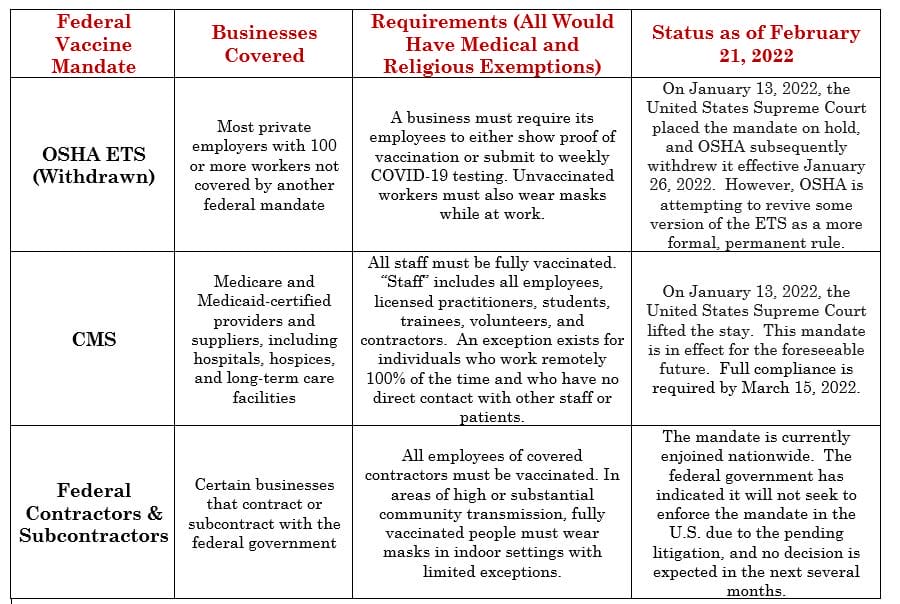
Categories

This article is authored by WLJ Labor & Employment attorneys Stuart Jackson and Shelby Howlett.
Numerous Arkansas businesses have some type of vaccination mandate in place. Some mandates are required by the federal government — like hospitals and nursing homes that must follow CMS’s vaccination mandate — while others are voluntary. And for those businesses that have voluntarily imposed their own mandates, state law kicks in to require options other than vaccination, such as weekly testing or natural immunity (testing positive for COVID-19 within the last six months or proof of antibodies).
Given that the various federal sources for the vaccine mandates (OSHA, CMS, contractor requirements) are all under court challenge to one degree or another, and the fact that one mandate (the now withdrawn OSHA emergency temporary standard) may morph into an OSHA rule, Arkansas businesses have to stay alert to what they have to do when it comes to vaccinations.
The Federal Mandates
The table below summarizes the various federal vaccination mandates and their current status as of mid-February 2022:

A lot of publicity surrounded the Supreme Court’s decision to place a hold on the enforcement of the OSHA ETS and OSHA’s subsequent decision to withdraw the ETS. Several businesses that would have been covered were relieved, partly out of the fear that any enforceable mandate would have caused them to lose employees in an already difficult labor market. But, an OSHA-based vaccination mandate is not dead yet. OSHA will get a second bite at the apple later this year when it rolls out a formal rule regarding COVID vaccinations. At this point, we don’t know the details of what the rule will say — will it be identical to the ETS, or will it allow options other than vaccination and masking? We also don’t know its scope — will it apply to larger businesses with more than 100 employees or all businesses? Will it apply to all industries or just some industries? For now, we’re waiting on OSHA to make its next move.
And remember — even without a presently-enforceable OSHA vaccine mandate, private businesses are still covered by OSHA’s general duty clause, meaning they must provide a work environment “free from recognized hazards that are causing or are likely to cause death or serious physical harm.” Private businesses should assume OSHA won’t look the other way if one or more of their employees experience significant health issues or death due to a workplace-related COVID infection. And to avoid general liability to the public, businesses should follow Arkansas Department of Health and CDC guidelines. The Arkansas General Assembly passed Act 559 in 2021, which grants immunity from lawsuits due to someone contracting COVID arguably at the businesses’ fault. However, that immunity only kicks in for those making good faith attempts to comply with state and federal safety guidelines. Businesses that ignore COVID-related safety guidelines are leaving the door open for OSHA investigations and lawsuits.
Voluntary Mandates
Despite the numerous federal vaccination mandates that are out there, a lot of Arkansas businesses are not covered by any of them. Some businesses chose to operate without vaccination mandates, while some imposed them. For those businesses that have imposed their own form of a vaccine mandate, remember this — Acts 1113 and 1115 require them to give unvaccinated employees options other than getting the jab. First, any such vaccination mandate must include an option for the employee to submit to weekly testing in lieu of getting vaccinated. Second, as an alternative to testing, the mandate must allow employees to show they have some level of natural immunity, either through proof of a positive COVID test within the last six months or proof of the existence of antibodies, instead of getting vaccinated. Failure to include these options in a vaccine mandate could in theory lead to a wrongful discharge claim if someone loses his or her job due to a refusal to get vaccinated.
Federal laws also play into voluntary employer mandates. The Americans with Disabilities Act and Title VII of the Civil Rights Act of 1964 potentially protect employees from termination who have legitimate medical or religious reasons for not getting vaccinated. Whether a business can in fact reasonably accommodate an unvaccinated employee due to medical or religious reasons is a case-by-case analysis, and safety is often cited as a legitimate reason for not accommodating a person seeking these types of exemptions.
Going Forward
The whole vaccine mandate issue is hard — businesses are between a rock and a hard place. No matter what a business decides to do, legal dangers lurk. So, decide whether you have to impose a mandate under federal law. If you are not required to do so, know that you still have a general duty under federal and state laws to provide a safe work place for your employees and that any mandate you do impose must have certain, built-in options or accommodations that allow unvaccinated employees to continue working.






































































